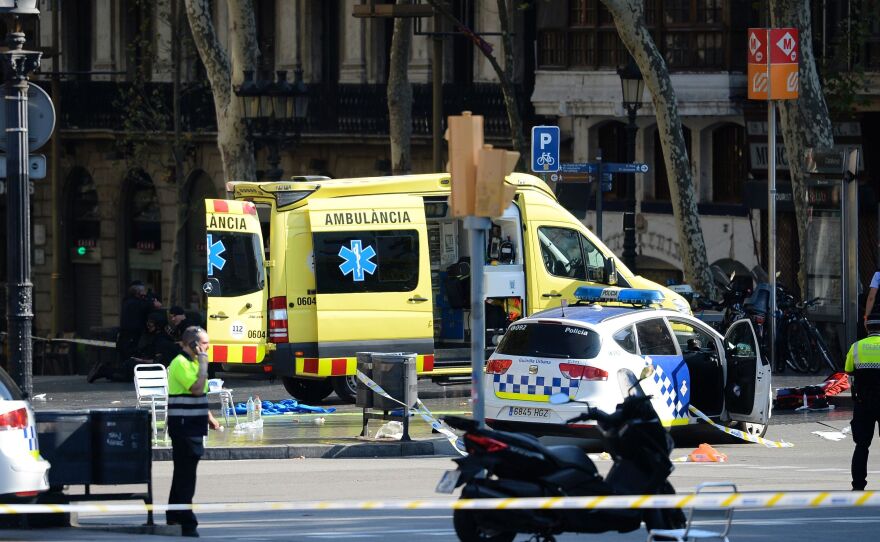Updated at 4:30 p.m. ET
A van drove into a crowd of people on a popular pedestrian street in Barcelona, Spain, on Thursday, killing at least 13 people and injuring at least 80, according to the Catalan government.
The driver of the vehicle fled the scene. Police say they have detained two people who might be connected to the attack. As of 8 p.m. local time (2 p.m. ET), officers were still evacuating people from the Las Ramblas area, and authorities confirmed that gunshots were exchanged at a checkpoint.
Regional police are describing the deadly incident on Las Ramblas boulevard as a terrorist attack but emphasized they do not know the motive.
The Islamic State has claimed responsibility for the attack through its Amaq news agency, the SITE Intelligence Group reports.
As NPR has previously reported, an ISIS claim of responsibility can mean a number of things. Some claimed attacks were planned by ISIS leaders, while others were planned independently. This time, the ISIS statement said that the "perpetrators" were "from the ranks of the Islamic State" and were responding to calls for attacks.
The white van slammed into scores of people after it jumped a curb and drove down the famous pedestrian walkway that runs down the middle of the Las Ramblas boulevard.
"It wasn't slowing down at all. It was just going straight through the middle of the crowd, in the middle of the Ramblas," an eyewitness told the BBC.
Keith Fleming, who lives in Barcelona, saw the aftermath of the attack from his balcony. He told The Associated Press that he saw "women and children just running."
On Twitter, the Catalan police force described the incident as a "massive trampling ... by a person with a van." Authorities were urging everyone in Barcelona to avoid the area and remain calm. Nearby metro stops, shops and restaurants have closed down.
Prime Minister Mariano Rajoy said on Twitter that he is in contact with authorities and that the priority is "tending to the wounded in Las Ramblas and facilitating the work of security forces."
Barcelona is the capital of Spain's autonomous Catalonia region, which has a distinct language and culture. Placa de Catalunya is a large public square in the city center, famous in its own right and well-visited as a transit hub. Las Ramblas (also known as La Rambla Boulevard), which includes a tree-lined pedestrian path, terminates in the plaza.
Authorities have advised the public to avoid both the square and the boulevard. Anyone in the region should stay where they are, officials say, and communicate via social media instead of telephone to avoid overwhelming the phone system.
Videos posted on social media show pedestrians fleeing the area.
International leaders have condemned the attack, with Prime Minister Theresa May saying, "The UK stands with Spain against terror," and President Trump tweeting that the U.S. condemns the attack "and will do whatever is necessary to help. Be tough & strong, we love you!"
Vehicular attacks have grown increasingly common as weapons of terror.
Massive car attacks struck Berlin and the French city of Nice in 2016. This past weekend, a man considered a white supremacist drove his car into a crowd of anti-racist protesters, killing one, in an incident U.S. authorities described as domestic terrorism.
Last December, Aki Peritz reported for NPR that it's difficult to prevent such attacks: "The potential targets are too numerous to defend them all," she says, and "a vehicle attack takes only one determined attacker."
This is a breaking news story. As often happens in situations like these, some information reported early may turn out to be inaccurate. We'll move quickly to correct the record and we'll only point to the best information we have at the time.
Copyright 2017 NPR. To see more, visit http://www.npr.org/.






